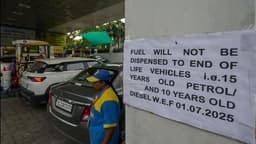Home / Health / Delhi's Toxic Air Fuels Neurological Health Crisis: Migraines, Strokes Spike Alarmingly
Delhi's Toxic Air Fuels Neurological Health Crisis: Migraines, Strokes Spike Alarmingly
10 Nov
Summary
- Delhi's air quality index reaches "very poor" levels
- 15-20% rise in neurological cases like migraines, dizziness
- Spike in sudden stroke cases, especially among those with vascular risks
- Pollution triggers anxiety-related headaches and mental fatigue
As of November 10th, 2025, Delhi's air quality has once again deteriorated, with the city's air quality index (AQI) standing at a concerning 346 in the early morning. This places the national capital firmly in the "very poor" category, just a day after more than 20 monitoring stations had slipped into the "severe" zone with AQI levels crossing 400.
While the respiratory and cardiac dangers of Delhi's toxic air are well-documented, doctors are now warning of a quieter but equally alarming threat: the growing impact on the human brain. Neurologists across the city report a sharp uptick in patients seeking treatment for a range of neurological complaints, including acute migraines, persistent headaches, dizziness, and mental fatigue.
In fact, doctors have observed nearly a 15-20% rise in neurological cases over the past few weeks alone. "Air pollution can directly increase the incidence and frequency of migraines, and even people who've never had headaches before are now coming in with pollution-triggered pain," explains Dr. Rahul Chawla, a Consultant Neurologist.
The situation has become so dire that even staying indoors no longer provides respite. Many young professionals like 27-year-old Rachna say their migraines have become far more frequent and intense since pollution levels started rising, with the mere act of stepping outside causing their heads to throb.
Alarmingly, doctors have also noted a spike in sudden stroke cases, particularly among individuals with existing vascular risk factors. Prolonged exposure to the fine particulate matter (PM2.5) in polluted air can trigger inflammation and oxidative stress, damaging neurons and blood vessels in the brain. This, in turn, increases the tendency for clot formation, effectively creating a "prothrombotic state" that heightens the risk of strokes.
Experts warn that if left unchecked, Delhi's worsening air pollution could fuel a long-term neurological health crisis. In older adults, chronic exposure can accelerate cognitive decline and raise the risk of dementia and other vascular disorders. The time to act is now, before the city's toxic air inflicts irreversible damage on the minds of its residents.




